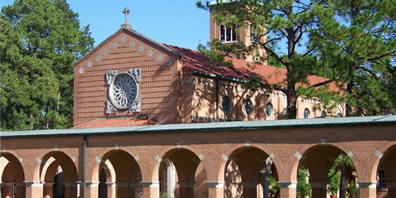
 The call for vocations in South Carolina is now going out in both English and Spanish.
The call for vocations in South Carolina is now going out in both English and Spanish.
“Bishop [Robert E.] Guglielmone wants an active presence among the Hispanic community in promoting vocations to the priesthood and religious life,” said Father Jeffrey F. Kirby, diocesan vicar for vocations. “There is a massive Hispanic population in South Carolina, and an urgent pastoral need for priests who are bilingual and understand Hispanic culture.”
The Charleston vocations office is now bilingual, as are promotional materials such as posters, prayer cards and interviews with seminarians on their website.
Rhett Williams, assistant to the vicar for vocations, spent three years in El Salvador with the Peace Corps and is bilingual. He travels with Father Kirby on parish visits, where he translates his homilies during Spanish Masses, and when people approach the vocations booth during the visits. Williams also fields calls from Spanish speakers interested in a wide variety of topics.
“It’s a very diverse community we’re just starting to tap into,” he said.
Father Teofilo Trujillo, a native of Colombia and vicar for Hispanic ministry, serves on the seminary admissions board, which evaluates men who want to become diocesan priests.
New candidates will now study at St. Mary’s Seminary in Houston and Holy Trinity Seminary in Dallas, where they receive more extensive exposure to Spanish language and Hispanic culture.
There is a concentrated effort to reach out to men and women who are first- or second-generation Hispanic Americans, Father Kirby said. More Hispanic men are now attending the monthly discernment groups he leads around the state.
Two seminarians, Javier Heredia and Francisco J. Onate-Vargas, studied and worked in South Carolina and became naturalized citizens before attending seminary.
Onate-Vargas, 24, is in his first year of college seminary at Holy Trinity. He said he knew since his childhood in Mexico that he wanted to be a priest, and is thankful there were people in the diocese to support him once he decided to pursue the call in 2010.
“There are a lot of guys like me in the Hispanic community who are interested in vocations but maybe don’t know what to do or how to get information,” he said. “It’s important that there are people willing to be an example to them, to reach out to them and pray for them.”
Another goal of outreach is for all seminarians to effectively serve Hispanics once they are ordained.
Stephen Beach of Charleston, currently in first theology at St. Mary’s, said his studies are preparing him to work effectively in a diverse community. He takes a Spanish class, helps teach a weekly religious education class at a local shelter for immigrants and many of his classmates are from Mexico and other Latin American countries. He also learns a lot simply by living in Houston and being exposed to the city’s large Hispanic community.
“It’s been an eye-opening experience to help reach out to people and also to learn more about Hispanic culture and traditions,” Beach said.
